Aussie families closer than ever during COVID-19
7 Sept 2020
There’s no doubt this unprecedented health crisis has changed the way Aussie families interact, with many forced to stay at home and spend more time together than ever before.
In our latest instalment of research, The New Family Norm, we asked over 5,000 Australian parents how COVID-19 has impacted their family unit, values and behaviours, as well as what they believe could be the lasting effects on their relationships, careers and children’s education.
The report reveals the Australian family unit is stronger than ever in the face of COVID-19 and social isolation, with close to nine in 10 (87.7%) finding new ways to connect and make the best of this challenging period.
Education during a pandemic
It’s unsurprising that a lot of us have had to home school both our primary and high school aged children at some point over recent months, with almost nine in 10 doing so during this pandemic (88.0%).
And although tough at times, half have managed home schooling well (50.0%), and over one in 10 found it ‘very easy’ (13.3%).
This hasn’t been the case for everyone though, more than one-third found it hard, confessing they struggled with it (36.6%). The main challenges have included the ability to keep children focused (73.9%) as well as being able to complete their own home duties (61.2%).

It hasn’t been all bad though, parents have generally enjoyed spending more time with their children (55.5%), seeing them adapt and do their best (43.1%) and have gained new insights into their children’s education (42.6%).
Long term impact on education
While some parents have enjoyed spending extra time with their children, the new normal has meant many have been – and some still are, juggling their day job with their newfound teacher role.
This new role has been eye opening for Australian parents and has made them think about the lasting impacts of this pandemic on their children’s education and self-development. It’s both understandable and concerning that one-third (30.7%) feel COVID-19 will leave a lasting impact on their children’s education, and ability to get into university or acquire certain jobs. Parents believe this period has created gaps in children’s knowledge (47.0%), a lack of key skill development (41.7%) while stunting their progress (39.2%). About a quarter (24.6%) even believe their child will have to repeat a year as a result of the pandemic.
The good news is that almost 70 per cent (69.3%) believe that their children’s education is unlikely to be impacted in the long run by this crisis.

Resilience of the family unit
Living through a once in a century pandemic is no easy feat – but they do say kids are resilient. At the start of the pandemic, parents noticed their children were more anxious about hygiene and ’touching things‘ (59.7%) as a result of social distancing. Most say their children had trouble adapting to the new rules (57.0%), and that they struggled to understand why they couldn’t – and in some instances still can’t – visit their grandparents (50.5%).
And it’s not just the kids that are adjusting, many parents have found this period hard, given the current environment has made visiting other family members difficult (76.9%).
Despite the challenges, an overwhelming majority have found new ways to connect and make the best of things (87.7%), with the pandemic actually bringing families closer together (80.3%).
The silver-linings of this crisis aren’t expected to be short-lived. Over half of parents say that they are more grateful (57.5%) and spend more quality time together as a family (58.2%), and they expect this to continue as restrictions ease.
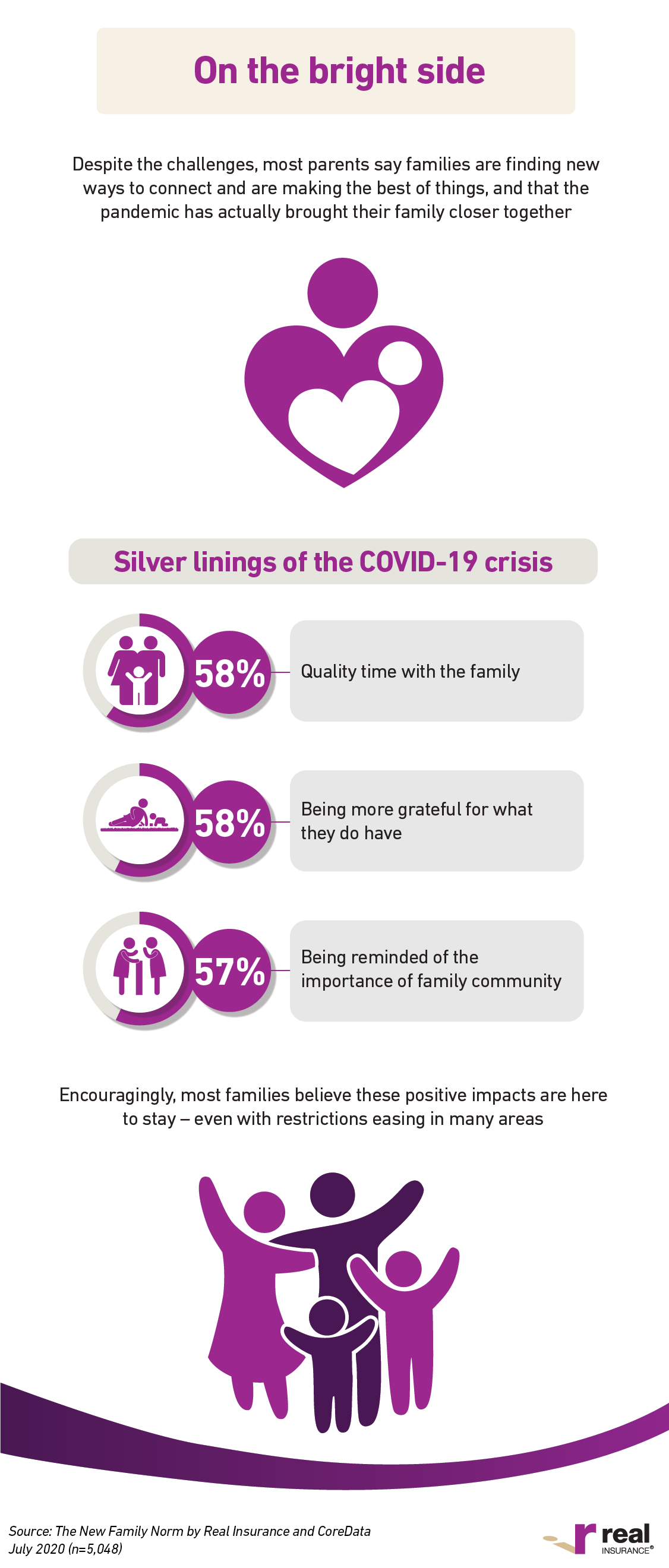
Parents stepping up
We have also seen traditional family roles and dynamics change. Parents are facing this crisis as a united front, stepping up their teamwork (85.0%), with dynamic roles in the household, while also teaching their children to take on more responsibility (79.2%). Making things a little easier during this time.
Unfortunately, single parents don’t have this advantage, and are finding it much tougher to manage (78.7%).
Long term impact on families
It’s not surprising that the longer this crisis continues, the more potential there is for our youth to struggle.
Most believe that if the crisis lasts for a while, the younger generation will be impacted significantly, across financial wellbeing (76.9%), their world view (85.6%) and the way they cope with anxiety and mental illness (78.5%).
But it’s not all doom and gloom, parents think the younger generation will also be more resilient (83.7%) and better equipped to deal with life’s uncertainties – a silver lining of an incredibly challenging time.
New ways of working
Although some have been doing it for quite some time, working from home, even just a few days a week, is becoming the new normal. Over half of Aussie parents have worked from home over recent months, and many still are.
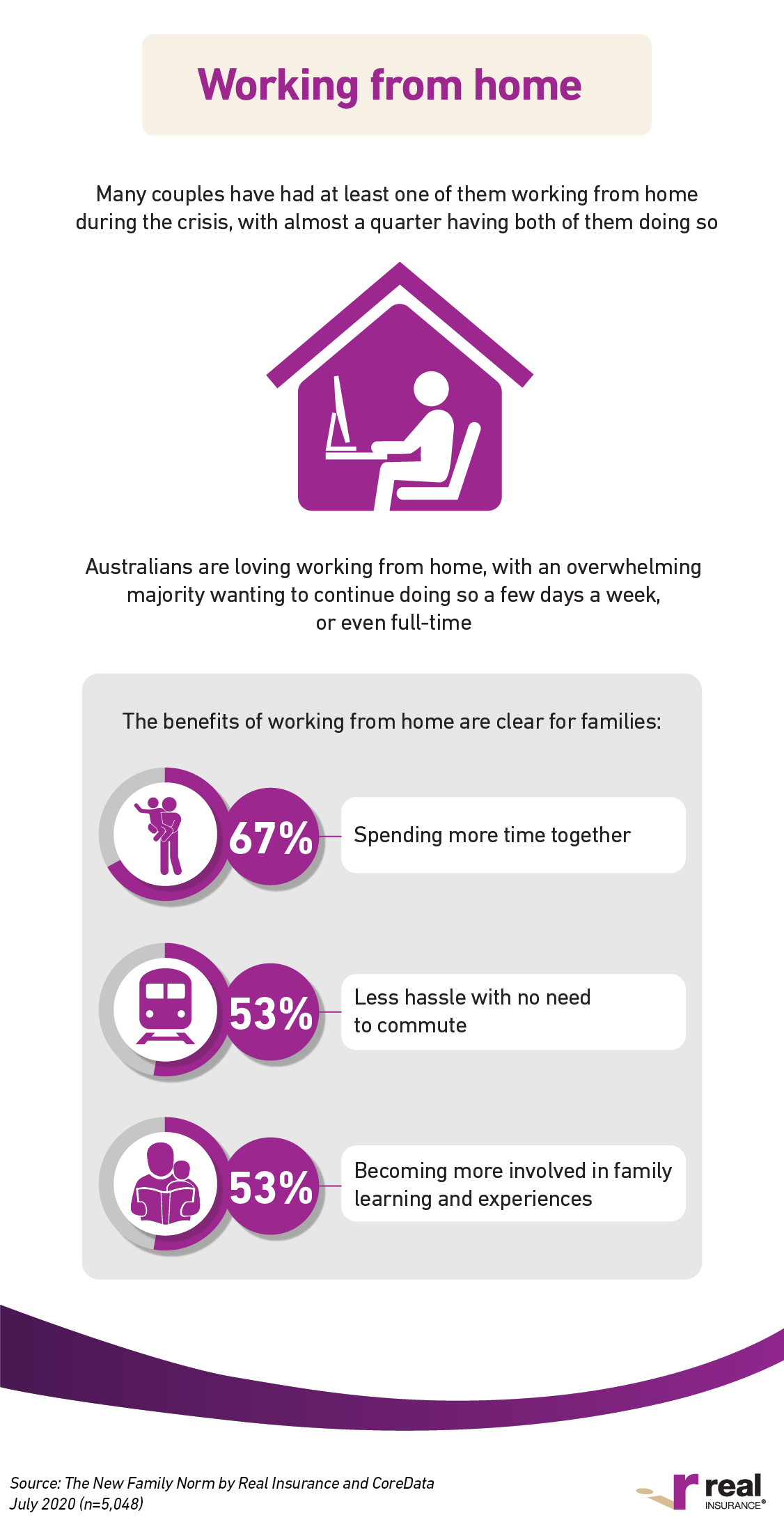
Australians are enjoying the flexibility that comes with working from home, with an overwhelming majority wanting to continue doing so a few days a week (51.4%) or even full-time (39.8%).
A clear drawcard of the home office is the benefit to family life, with families spending more time together (67.2%), spending less time commuting (53.0%) and becoming more involved in family learning and experiences (52.9%).
Crisis in the digital age
A pandemic is never a welcome occurrence, but the dawn of the digital age has made things more manageable. An overwhelming majority say it’s helped them stay socially connected with family and friends (91.2%) and has even provided more opportunities to spend time with relatives (89.4%). So It seems the modern-day debate and guilt over screen time has turned a corner. Almost one-fifth think ‘family time’ can now be more digitally focused in light of COVID-19 (18.5%).
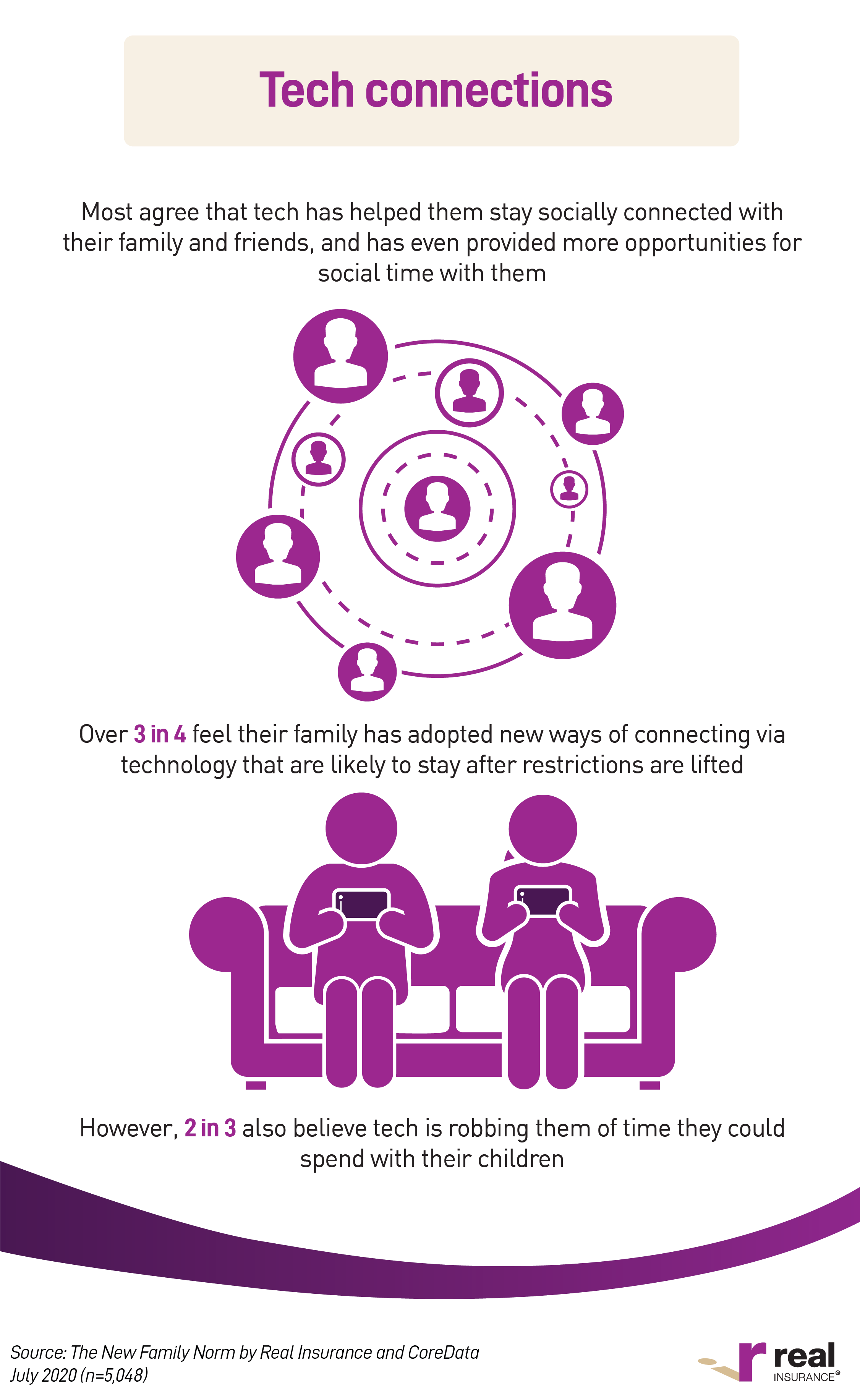
But it’s not all screens and video calls, families are also spending more time outdoors (32.7%) and doing other activities like cooking (47.2%) and playing physical games or doing puzzles together (35.8%).
Prioritising life
This extra time has led many to reassess what’s really important and many are choosing to focus on their health, with a majority engaging in a physical activity more often than before (50.4%). Walking, exercising, and cycling are all very popular choices of recreation. Nine out of 10 parents are enjoying these new activities so much, that they are confident they will keep them up after the pandemic passes (90.0%).
Australians are problem solvers, even in the face of lost income and its stresses. Even though over three in five (60.2%) have experienced some sort of reduction in their income, many are seeing this as the ideal time to learn new skills that will make them better workers (69.7%).
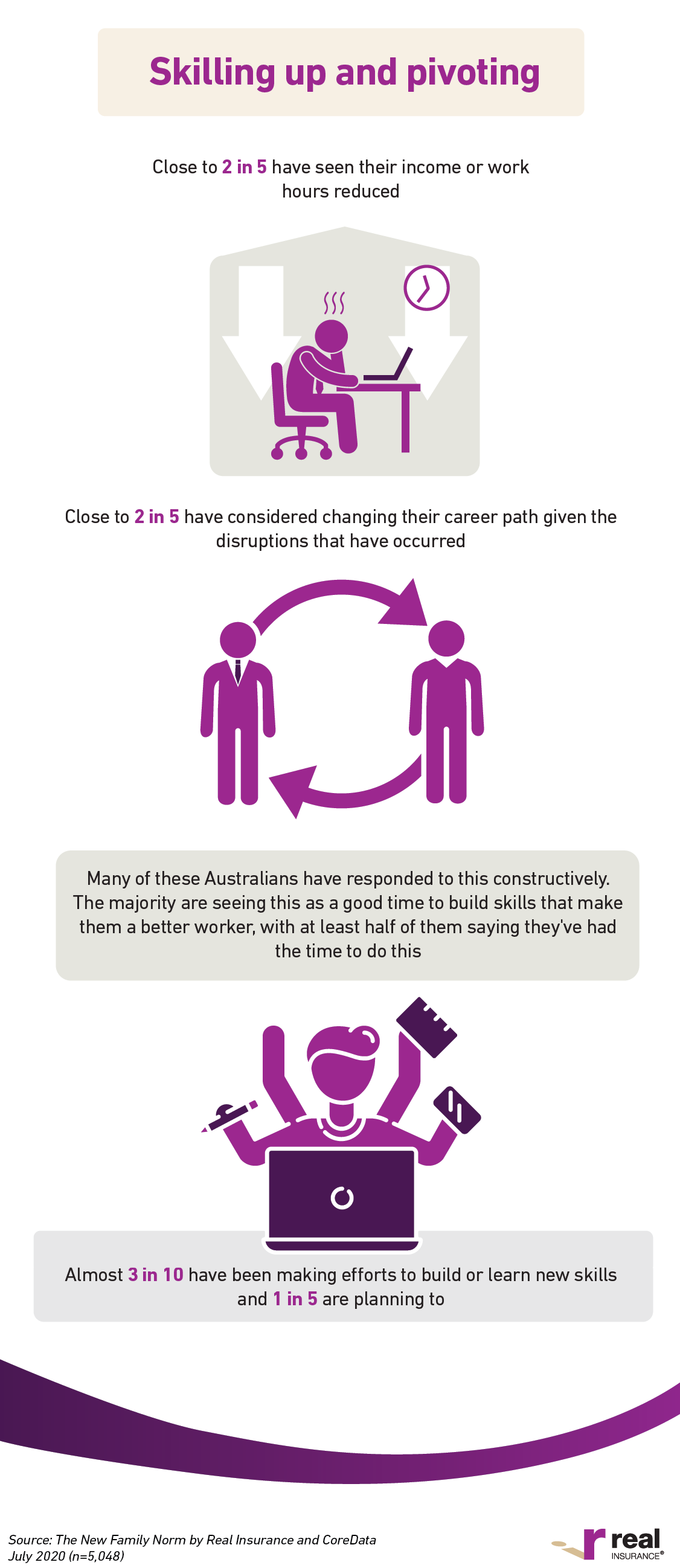
Australian positivity
The strength of the Australian community in a crisis is unparalleled. Mateship continues to be a key part of our culture, and this has been shown once again during the COVID-19 pandemic.
People have come together with community gestures like driveway events (21.0%), local drives for those in need (27.5%), and teddy bear spotting with kids (39.6%).
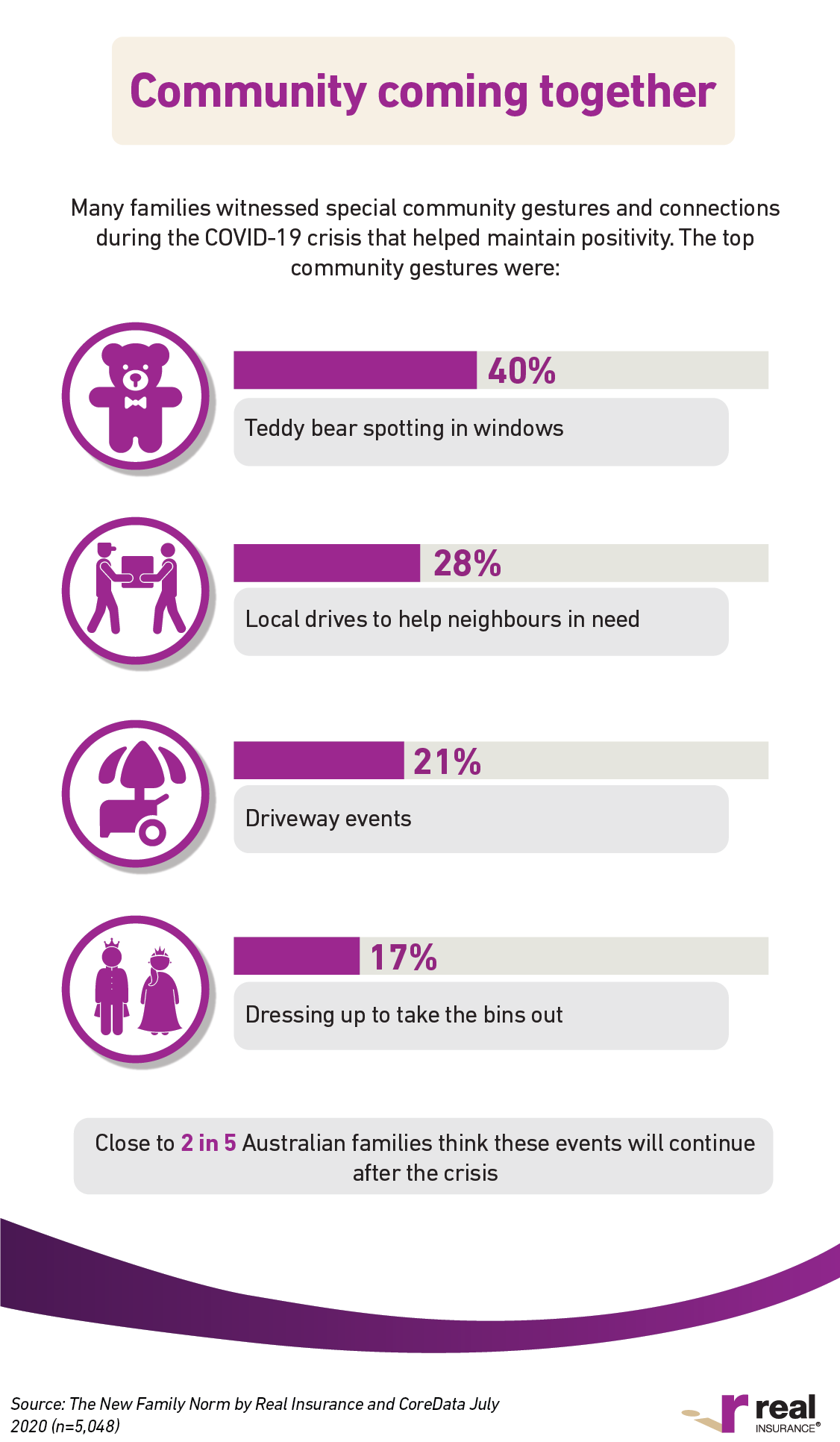
The research and current climate show that we are going through a period of change, but Australians are known for having a positive outlook on life, and this outpour of community support, the way families have adapted and the optimism for the future are all further proof of that – and something we can all be proud of for decades to come.
More of the real deal from Real Insurance coming soon.
Download full research report
- New Family Norm [PDF]